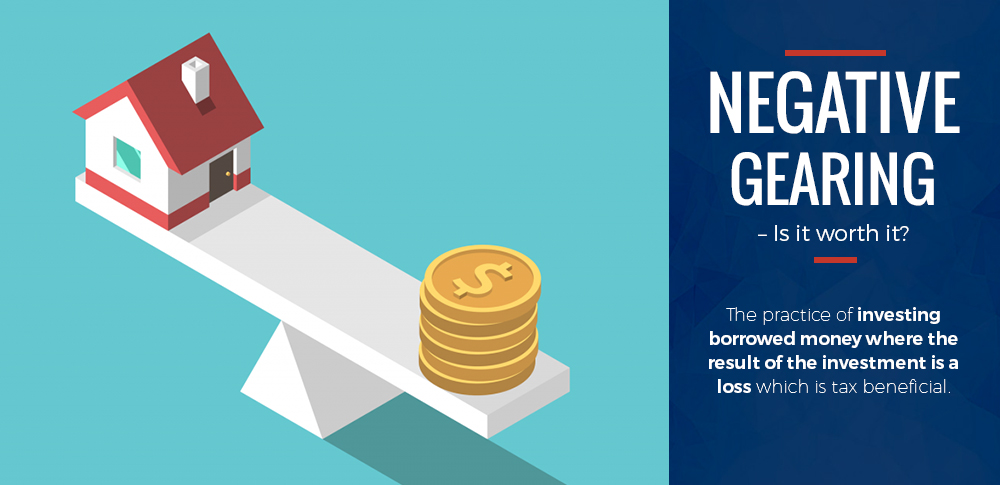The idea of becoming a property investor is very attractive, but there’s a lot to consider before jumping in. Something we hear about a lot in the property world is positive and negative gearing, which are two very different investment strategies. The term gearing simply means borrowing money to invest, and it’s usually used when referring to property investment. As you will see, property investor taxation is one of the key factors to take into account before deciding which investment strategy will best suit your current circumstances, as well as your future goals.
Negative and positive gearing – what’s the difference?
A property is positively geared when the rent you receive from your tenants is higher than your holding costs, such as mortgage repayments, property management fees, body corporate fees, rates, maintenance, and any other outgoings. Investors will get a return on a positively geared property straight up, which is added to their total income for taxation purposes.
A property is negatively geared when the rental return is less than the total holding costs. In other words, the cost of owning the property is greater than its rental income, and you’re left with a negative. Your income from employment, business, or other investments will need to support the costs that aren’t covered by your rental return.

Why would I invest in something that’s losing money?
Now, it may at first sound like negative gearing is a terrible idea… but this investment strategy can help you save money on tax and make money through capital gains in the future. Negatively geared properties tend to be in more stable areas with easy access to all amenities, and growth in these areas can be predicted. By contrast, positively geared properties can be an immediate source of income, but it comes with the risks associated with lower socio-economic areas, and there is limited potential for growth.
For example: The return on an investment property in a remote, regional, or mining town depends heavily on international commodity market. While this could be a great positively-geared investment in the short term, it’s very unlikely to be good for long term growth.
Both negatively and positively geared investment properties are subject to income tax, capital gains tax (CGT), and even goods and services tax (GST). We all know that the higher our employment income, the more tax we pay. If you’re employed, your tax is taken out based only on the income from your job. Investors take the loss from their negatively geared property and add it to their overall income, lowering their total taxable income. As a result, property investors can get a large tax refund once their negatively geared property is factored in. They may also benefit from long-term capital growth, as long as they are able to put surplus income towards supporting the investment.

A word of warning…
As you can see, negative gearing works best if you have a higher taxable income, and fall into the higher tax brackets. When managing an investment property, there will be times when the costs are much higher. For example, you’ll be forking out a lot more money when your property is vacant, or when it needs repairs, and so on. Before deciding that negative gearing is the right investment strategy of you, speak with your investment property tax specialist to ensure you have enough income to manage any unexpected expenses that come with owing a property. Investing in a property that is located near all the major amenities and appeals to a wide range of tenants is a good way to avoid long-term vacancy.
For this reason, investors’ closer to retirement or in a lower income bracket may choose a positively geared strategy to maximize their income potential and get an immediate return on the investment. However, it’s important to ask questions such as:
‘Why is the tenant willing to pay more to rent the property than to actually own it?’
‘Do people want to live in this area?’
‘Will the lower average income in this area mean there is less potential for growth?’
‘How reliable will my tenants be?’
The main benefit of the negative gearing strategy is that any loss may be offset against your other income streams, reducing your taxable income and your tax payable. According to Australian tax law, you may be able to claim the interest on your loan repayments, as well as some other costs as an expense, as long as your property is available to be rented. Although this means you will be operating at a loss, there are many financial benefits to this property investment strategy.
Depreciation benefits.
Just like a new car, a new property will depreciate in value over time – but did you know property depreciation can be used to your benefit? The ATO allows investors to claim the decline in value of the property as a tax deduction, which means many of the costs associated with negative gearing can be ‘written off.’
Tax depreciation benefits can be equivalent to around 60% of the annual rental income of an investment property. The result is that investors need to put less of their other income towards the holding costs and over time, the majority of negatively geared properties will turn positive.
In the end, passive income should be the intended outcome for both positively and negatively geared properties. Rather than being taxed on this passive income, talk to your Property Investment Tax Specialist about creating a depreciation schedule.

Why does the government reward negative gearing?
The Australian government allows very generous concessions to negatively-geared property investors. Without negatively-geared property investors in the market place, there would be a very limited supply of affordable housing in the market. Many overseas cities are facing an affordable housing crisis, and there are serious social issues around public housing. In Australia however, we use our tax system to subsidies housing.
In other words, the affordable housing provided by investors’ means our government doesn’t have to spend more tax-payer dollars on public housing. In order to maintain this comparatively successful structure, the government rewards negative gearing by making many deductions available, in addition to other generous incentives.
This is where choosing the right accountant can really pay off! Most accountants aren’t property specialists, which mean they are likely to miss even the most common deductions around borrowing expenses and depreciation. Maximum deductions for property investors will be achieved by accountants who have hands on experience in the real estate world.
While it’s important to understand how negative gearing can reduce your tax, it would be naive to invest purely for a tax benefit. Either invests for income, or invests for growth – and view any tax benefits as an added bonus!

Choosing the right accountant is key!
If you want your investment property be negatively-geared in a positive way, choosing the right account is key. As with all investments, your strategy should be in alignment with your personal circumstances, as well as your individual goals. If you are thinking about investing, talk to an Investment Property Tax Specialist who can help you claim everything related to improving, managing and holding your investment property. The best specialist will show you the safe way to structure your debt and develop a safe system and strategy for success in your future property purchases.
ABA Investment Property Specialist are hands-on property investors with over 20 years’ experience in property investment and the Real Estate industry – and we’re always available for a chat! We’d love to hear from you and assist you on your property investment journey.
Visit https://www.abatax.com.au/ to know more.
Contact Us: info@abatax.com.au
Phone No: 1300 797 175